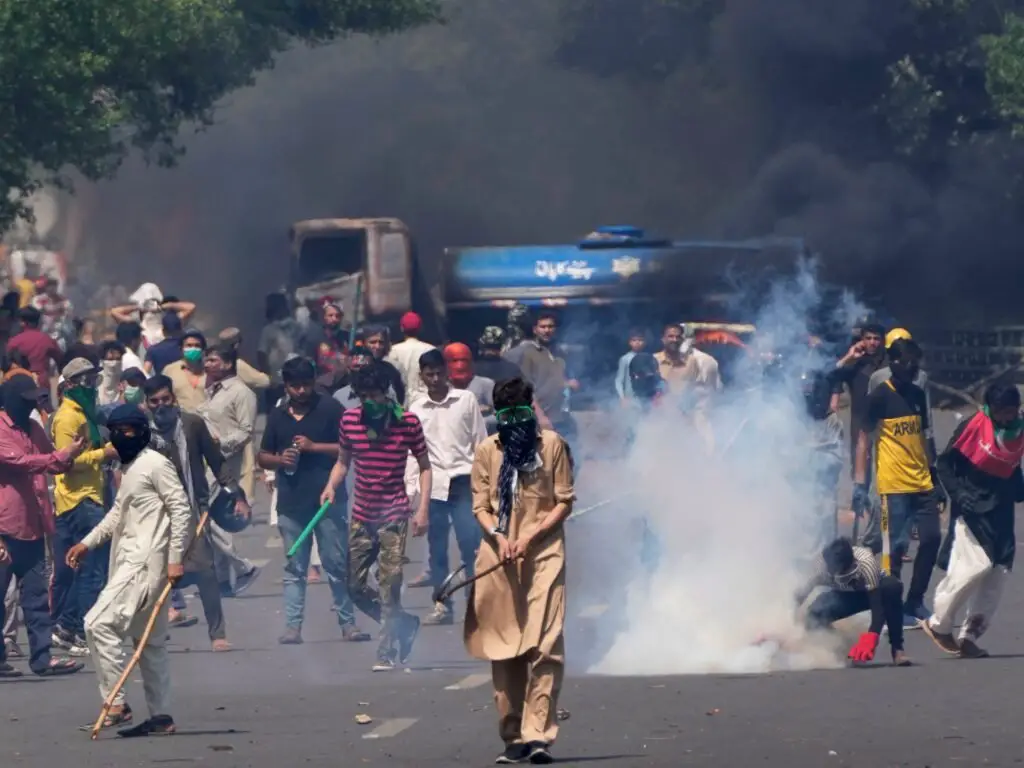Islamabad, Pakistan – The recent conviction of 25 civilians by a military court in Pakistan sparked sharp criticism from the US on Monday, which accused the proceedings of lacking “judicial independence, transparency and due process guarantees”.
“The United States is concerned about the military tribunal sentencing of Pakistani civilians and calls on the Pakistani authorities to respect the right to a fair and due process,” a State Department spokesman said Matthew Miller said on Xthe social media platform.
This US statement follows similar concerns from the United Kingdom and the European Union (EU), which also questioned the use of military courts to try civilians.
The EU was the first to respond Judgments of the military court of December 21stissued a statement the next day expressing “concern” over the conviction, adding that the verdicts “contradict the obligations Pakistan has under the International Covenant on Civil and Political Rights (ICCPR) has taken over”.
The EU also highlighted Pakistan’s beneficiary status under the Generalized System of Tariff Preferences Plus (GSP+), which allows Pakistani exports duty-free access to European markets – a reference that was widely seen as a subtle warning that a perceived failure to comply with international human rights obligations could jeopardize that status.
Why did Pakistan punish civilians through military courts, how did Islamabad respond to criticism from the USA, Great Britain and the EU and what happens next – for Pakistan and its relations with the West?
What were the military trials about?
The recent military trials stem from nationwide unrest that followed Arrested on May 9th of former Prime Minister Imran Khan in Islamabad last year.
Supporters of Khan’s Pakistan Tehreek-e-Insaf (PTI) party attacked government buildings, monuments and military installations, including the army headquarters in Rawalpindi and the residence of a senior military official in Lahore, which was set on fire.
Khan was released within 48 hours of a Supreme Court ruling, but thousands of PTI workers were arrested over the violence.
Of these, 105 were referred to military courts. In April this year, 20 people with sentences of less than three years were released and 85 remained in prison.
On December 21, the military announced that 25 people had been convicted, with at least 14 receiving 10-year prison sentences.
The military has defended the proceedings, saying it followed due process and ensured the legal rights of the accused.
Last month, the United Nations Human Rights Committee called on the Pakistani government to review its legislation on military courts and remove its jurisdiction over civilians.
How has Pakistan responded to criticism of the conviction?
Earlier this week, Pakistan’s Foreign Ministry responded to the EU’s comments. Spokesperson Mumtaz Zahra Baloch said the government was reviewing the statement, but noted that Pakistan’s constitution and judicial system – and not any foreign body – would guide its domestic political and legal decisions.
On Tuesday, the Foreign Office released a more detailed statement insisting that Pakistan’s legal system “ensures the promotion and protection of human rights and fundamental freedoms” and complies with “international human rights law, including provisions of the International Covenant on Civil and Political Rights.” Consistent Rights (ICCPR)”.
“We will continue to work with our international partners, including the European Union, to comply with international human rights standards without any discrimination and double standards,” the statement said.
What is GSP+ status and what does it have to do with military courts?
GSP+ is a program run by the EU that aims to encourage partner countries to improve their governance standards and focus on sustainable development by providing preferential trade access.
Under the EU’s GSP+, countries granted the status must comply with and “effectively implement” 27 core international conventions – including the ICCPR – in order to continue to benefit from GSP+ status.
The conventions are non-economic in nature and focus on issues such as human rights, labor rights, the environment and good governance.
Pakistan is one of eight countries benefiting from the benefits of GSP+, most notably duty-free access to European markets. Bolivia, Cape Verde, Kyrgyzstan, Mongolia, the Philippines, Sri Lanka and Uzbekistan are the other countries with which the EU is working under the GSP+ initiative.
In its statement on the Pakistan judgment, the EU said that under the ICCPR people have the right to a fair and public trial before an independent and impartial tribunal with adequate legal representation.
The Pakistani government argues that its constitution allows civilians to be tried in military courts, a practice that was maintained even during Imran Khan’s term as prime minister between 2018 and 2022.
However, military trials are often criticized for their secrecy and lack of transparency. Although defendants have the right to counsel, these courts lack the public scrutiny typical of civil litigation.
Haroon Sharif, a former state minister, warns that non-compliance with non-economic obligations could harm Pakistan’s economic interests.
“Such agreements are instruments for political negotiations. When a country’s politics is fragmented, it affects economic outcomes and creates serious challenges,” he told Al Jazeera.
Could Pakistan’s exports take a hit?
The PTI sees the military trials as part of a broader, two-year crackdown on the party after Khan was ousted by a no-confidence vote in parliament in April 2022.
The former prime minister himself was re-arrested in August 2023 and is again imprisoned, among dozens of other charges against him, including sedition and terrorism in connection with the May 9 riots. The military denies allegations of targeting the PTI.
Former Prime Minister Shahid Khaqan Abbasi also questioned the decision to try civilians in military courts, arguing that the trials gave rise to criticism from international bodies.
“The government could have used anti-terrorism or other civil courts to ensure transparency. Military trials, although constitutional, are contrary to fundamental rights,” he told Al Jazeera.
Former finance minister Miftah Ismail also described military trials as “archaic” and called on the government to engage diplomatically with the US, UK and EU to explain the reasons for using them in this case.
“GSP+ status is crucial as it allows duty-free access to European markets. “Losing this status could reduce Pakistan’s exports by 20 to 30 percent,” he told Al Jazeera.
In 2023, EU figures showed Pakistan was the largest GSP+ recipient, with more than 78 percent of its exports to Europe – worth almost 4 billion euros ($4.2 billion) – entering duty-free. Textiles and clothing accounted for 73 percent of these exports.
Sharif, who was also chairman of Pakistan’s Board of Investment (BoI), says the country’s economic managers need to be aware of the fact that EU countries, as well as the UK and US, have major influence on decisions at the International Monetary Fund (IMF), which provides a lifeline to Pakistan-$7 billion in loans.
“Pakistan is isolating itself by not engaging with the global community and its institutions and this results in high transaction costs due to our ongoing domestic political disputes,” he said.
“The country needs to reduce the intensity of this volatile political landscape, create space for itself with a professional perspective and find a way to integrate into global institutions. Otherwise, incompetence could lead to market shocks,” Sharif said.





